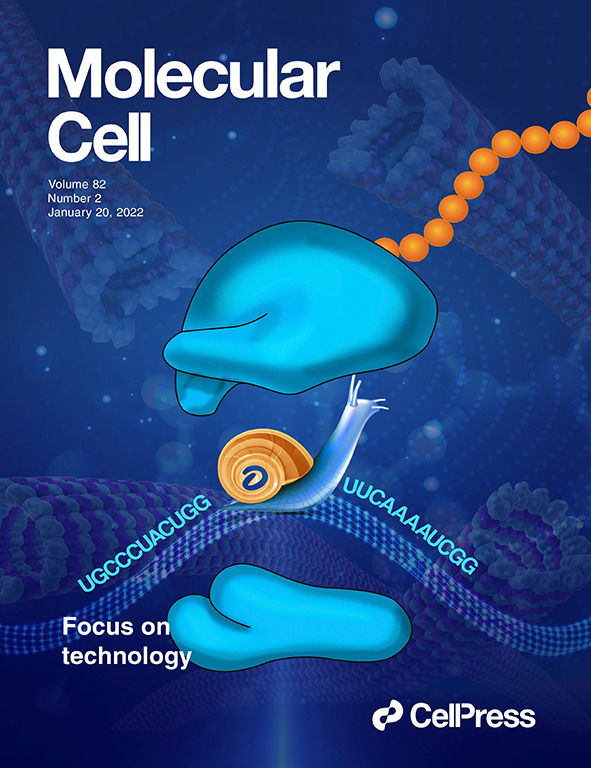肿瘤源性CD84通过调节非同源DNA末端连接途径促进急性髓系白血病细胞生长。
IF 6.5
3区 生物学
Q2 BIOCHEMISTRY & MOLECULAR BIOLOGY
引用次数: 0
摘要
CD84是信号淋巴细胞激活分子(signaling lymphocyte activation molecule, SLAM)免疫球蛋白超家族的一员,在调节多种免疫细胞活性中发挥着重要作用。然而,它在癌细胞中的内在作用在很大程度上仍然未知。我们的目的是探索CD84在急性髓性白血病(AML)进展中的直接作用,并阐明参与非同源末端连接(NHEJ)修复的潜在分子机制。在这里,我们发现CD84在各种类型的AML和白血病起始细胞(lic)富集的细胞中经常上调。敲低或阻断CD84可显著抑制AML细胞的生长并诱导细胞凋亡。此外,敲低CD84可显著延缓AML的进展,延长异种移植小鼠的体内存活时间。机制上,CD84通过募集SAP和激活AKT信号通路促进NHEJ核心因子的表达。敲低CD84通过调节NHEJ核心因子(包括PRKDC、LIG4、XRCC5和DCLRE1C)的表达抑制AML细胞的NHEJ修复。随后,这导致双链断裂(DSBs)积累和细胞凋亡。重要的是,CD84是人类LICs增殖和自我更新所必需的。综上所述,CD84通过促进NHEJ修复在AML的生长和进展中发挥重要作用。靶向CD84可能是抑制AML发展和消除LICs的潜在途径。本文章由计算机程序翻译,如有差异,请以英文原文为准。
Tumor-derived CD84 promotes growth of acute myeloid leukemia cells via regulating nonhomologous DNA end-joining pathway
CD84, a member of the signaling lymphocyte activation molecule immunoglobulin superfamily, has been identified as playing a significant role in regulating various immune cell activities. However, its intrinsic role in cancer cells remains largely unknown. We aim to explore the direct role of CD84 in acute myeloid leukemia (AML) progression and to clarify the underlying molecular mechanisms involved in nonhomologous end-joining (NHEJ) repair. Herein, we found that CD84 is frequently upregulated in various types of AML and leukemia initiation cells (LICs)-enriched cells. Knockdown or blocking of CD84 significantly inhibits the growth and induces the apoptosis of AML cells. Moreover, knockdown of CD84 significantly delays AML progression and prolongs the survival of the xenografted mice in vivo. Mechanistically, CD84 promotes the expression of NHEJ core factors by recruiting SAP and activating the AKT signaling pathway. Knockdown of CD84 inhibits NHEJ repair in AML cells via regulating the expression of NHEJ core factors, including PRKDC, LIG4, XRCC5, and DCLRE1C. Subsequently, this leads to double-strand breaks accumulation and cell apoptosis. Importantly, CD84 is required for the proliferation and self-renewal of human LICs. In conclusion, CD84 plays important roles in AML growth and progression through promoting NHEJ repair. Targeting CD84 may be a potential approach for inhibiting AML development and eliminating LICs.
求助全文
通过发布文献求助,成功后即可免费获取论文全文。
去求助
来源期刊

Molecules and Cells
生物-生化与分子生物学
CiteScore
6.60
自引率
10.50%
发文量
83
审稿时长
2.3 months
期刊介绍:
Molecules and Cells is an international on-line open-access journal devoted to the advancement and dissemination of fundamental knowledge in molecular and cellular biology. It was launched in 1990 and ISO abbreviation is "Mol. Cells". Reports on a broad range of topics of general interest to molecular and cell biologists are published. It is published on the last day of each month by the Korean Society for Molecular and Cellular Biology.
 求助内容:
求助内容: 应助结果提醒方式:
应助结果提醒方式:


